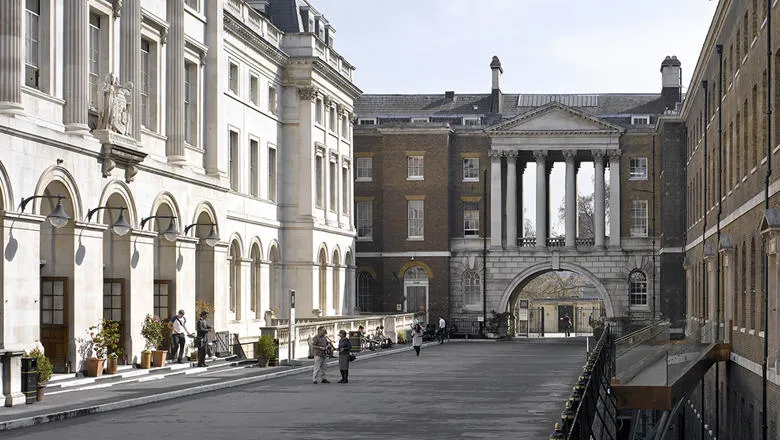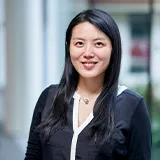21 July 2021
Meet King's newest Engineers
Interview with new academics in the Department of Engineering

Awe-inspiring devices? Design-driven innovation? Changing industry’s productivity and footprint? The most recent academics to join King’s Department of Engineering are working on different issues but all share a desire to make the world a better place. We chatted with Dr Wei Liu, Professor Rym M'Hallah and Dr Emmanouil Spyrakos about their work.

Dr Wei Liu
What are your main areas of research and what are you currently working on?
I’m particularly interested in how engineering design may trigger sustainable innovation in industries and how design thinking and methods may support engineering subjects to develop human-centred solutions to real world challenges.
What inspired you to join the field of engineering?
My father is an engineer and entrepreneur, who inspired me a lot during my childhood and has a strong belief that engineering and design may bring a better world for people. But at the same time, he told me that, when creating new artefacts, we need to consider if it is something people want but not just a useless machine with no commercial value. Design links engineering with human experiences and ensures that innovation truly benefits people and society. Bringing together the engineering depth, design methodology and commercial understanding, I hope to support engineering students to be the real-world changers in future, especially encouraging more female engineering students to recognise their unique values in understanding people and promoting innovation.
What do you hope to achieve through your work at King’s?
One important task is how to transform engineering education to inspire thinking and creativity. I am thrilled to join such a prestigious team at King’s and cherish the opportunities to lead the design education and development of maker spaces at King's with the guidance of our inspiring leaders and support from our passionate colleagues. I hope that embedding Design Thinking and Making pedagogy into the education will support King’s to cultivate future world leaders with creative mindsets.
What are the biggest challenges you encounter in your research field?
As I am an academic being committed to interdisciplinary research, the biggest challenge in my research field is how to use design as an approach to achieve value in interdisciplinary collaborations, given the fact that not many scholars from other subjects have been aware of the value of design-driven innovation. But I try to overcome the challenge with research openness and proactive engagement. For example, together with computer scientists, we have made a successful bid to EPSRC, using design thinking and human-centred design methods to develop an innovative research project in software engineering field. I hope in the future, together with researchers from other engineering subjects, we may develop more innovative and interdisciplinary research projects.
Tell us about a way that engineering affects everyday life in 2021
Engineering can be seen everywhere in our daily life to change the world better. In 2020 - 2021 particularly, we have seen many examples of how engineering design help to improve the life of people against Covid-19, from crowdsourced design of face shields to exapted design and manufacture of ventilators. Inspired by this, I have recently published a research paper on this topic, which can be openly accessed from: https://onlinelibrary.wiley.com/doi/full/10.1111/radm.12460
What advice would you give to someone considering studying Engineering?
Innovations come from the sum of people’s wishes, technology’s feasibility and business’s viability. As an innovative engineer, you are expected not only to solve technical problems, but also to understand people and business context, translating technologies through design to innovation that truly benefits to people and society. If you would like to be a leading innovator in future, King’s Engineering is the right place as we offer all above in our education to students.
What do you do in your spare time?
I enjoy reading and family time outside work. And I do voluntary work in local community and sing in a choir as an alto.

Professor Rym M'Hallah
What are your main areas of research and what are you currently working on?
Design, modelling, simulation, and optimisation of real-life complex systems: How to provide better service and products at the lowest societal cost. Services can be in manufacturing, health care, logistics, and education. Products vary from tiny chips to car components to power plants and systems of systems.
What do you hope to achieve through your work at King’s?
Having a sizeable impact on industry’s productivity and footprint; reshaping engineering education; raising awareness of the role and importance of systems engineering in the shaping of the future of our planet; recruiting more women and underrepresented minorities; and offering underprivileged students an equitable chance to break the glass ceiling and succeed in engineering.
What advice would you give to someone considering studying Engineering?
Embrace the field; be confident, creative, innovative, and open-minded; be a leader and a team player; work hard but enjoy the growth and the learning process. You are in the path of a challenging but rewarding career!
What are the biggest challenges you encounter in your research field?
Making the right assumptions, choosing the most appropriate model, designing realistic simulations, and effectively defining the boundaries of a problem. Tackling these challenges effectively determines the usefulness of a solution and the likelihood of its implementation.
What inspired you to join the field of engineering?
My desire to push the boundaries of science, systems, and knowledge; to have a palpable lasting impact; to make global changes to existing systems; and to automate manufacturing processes so that workers exploit their time and talent more constructively and productively. But my biggest inspiration was my parents and my grandmother who instilled in me the desire to improve things.
Please give us an example of engineering enhancing everyday life in 2021 that you particularly like
The most palpable example is the NHS withstanding the pandemic thanks to Management and Systems Engineering. We will shortly be witnessing surgeons operating on patients that are thousands of miles away, and humans living in Mars.
Aside from Engineering, what do you do in your spare time?
Read, exercise, visit museums, and volunteer.

Dr Emmanouil Spyrakos
What are your main areas of research and what are you currently working on?
My research focuses on the practical and theoretical resolution of problems that currently impede widespread use of robotic devices, within human-inhabited environments. I am looking at topics including flexible-joint systems, nonlinear control, humanoids, bipedal balancing, legged systems, optimal control, impedence control, and human-robot interaction.
What are the biggest challenges you encounter in your research field?
The field of robotics is replete with interesting challenges, both from a practical and a theoretical perspective. Many of these difficulties stem from the fact that robotics is an interdisciplinary field that amalgamates knowledge from the fields of electronic engineering, mechanical engineering, mathematics, control theory, and computer science, to name a few. Hence, even if one manages to contrive, and implement, a highly sophisticated algorithm on low-quality hardware, or hardware that is unsuitable for a particular task, the latter will always induce severe performance limitations. Likewise, one can design and build a mechanically advanced robot that might be limited by its control system, or computer algorithm. Achieving this fine balance and congruency between hardware and software, could be perceived as one of the main challenges in robotics, as it necessitates continuous co-development, and refinement, of technologies that fundamentally pertain to disparate domains, for the purpose of achieving desirable degrees of synergy.
What do you hope to achieve through your work at King’s?
My ambition is to contribute, to some degree, towards the creation of a fairer society, which can unequivocally be achieved through technological advancements. I profoundly believe that robotics and AI can support the formation of a global economy capable of functioning with minimal human intervention, which will hopefully translate to fairer distribution of wealth, in addition to increased levels of professional and political freedom for the vast majority of people. As such, the average person will be able to devote more time to the fulfilment of their personal ambitions, and to partaking in the development of a more inclusive, and participative, political system.
What inspired you to join the field of engineering?
I received my first LEGO Mindstorms kit at age 13, which piqued my interest about the evolution of robotics. I initially started delving into the early robotic devices produced by Heron of Alexandria, who served as a major source of inspiration, as well as those subsequently invented during the Medieval times (Ismail al-Jazari), Renaissance Period (Jacques de Vaucanson, Leonardo da Vinci, Pierre Jacquet-Droz), and the 20th century (W. H. Richards of Devon, Alan Turing). I was quickly convinced that I would be willing to spend the rest of my life working in a robotics lab, developing the awe-inspiring devices that were on display mainly in sci-fi movies (at the time). In that respect, Engineering certainly seemed like the most appropriate career choice.
Please give us an example of engineering enhancing everyday life in 2021 that you particularly like
I believe that we are very fortunate to be living in an age of rapid technological advancement that predominantly yields manifold benefits, in terms of the average person’s quality of life. Over the last year, there has been a surge in “COVID Robots”, which is a recently-coined term that encapsulates those robotic devices that have either been developed for, or tailored to, the needs of a minimal-physical-contact world. Aside from that, however, I really like the degree to which the Internet, and telecommunications infrastructure in general, can empower those who are living either in poverty, in war-ridden zones, or under unfavourable circumstances.
What advice would you give to someone considering studying Engineering?
If you have a natural aptitude for maths, physics, computing, or problem solving in general, then Engineering might be the right choice for you. Engineering entails putting theoretical knowledge into practice, so if you possess an inherent fascination with theoretical concepts, and are willing to observe how these manifest themselves in the physical world, then you may wish to consider pursuing a degree in Engineering. Also, if you are enamoured of futuristic devices that you may have seen in movies, or read about in novels, and are willing to become involved in their development, then you should definitely consider a degree in Engineering.
Aside from Engineering, what do you do in your spare time?
I strive to learn about different cultures and their history, which I find engrossing, and as a result of this, I thoroughly enjoy travelling. I have an inherent passion for philosophy, and I continuously strive to devote time to the reading, and comprehension, of classical, philosophical texts. Moreover, I am an ardent cinephile, even though I have been forced to forgo any pertinent activities over this last year. In terms of outdoor activities, I frequently engage in long-distance running, and also used to play football on a regular basis, although this abated dramatically once I commenced my doctoral studies, and research career in general.

